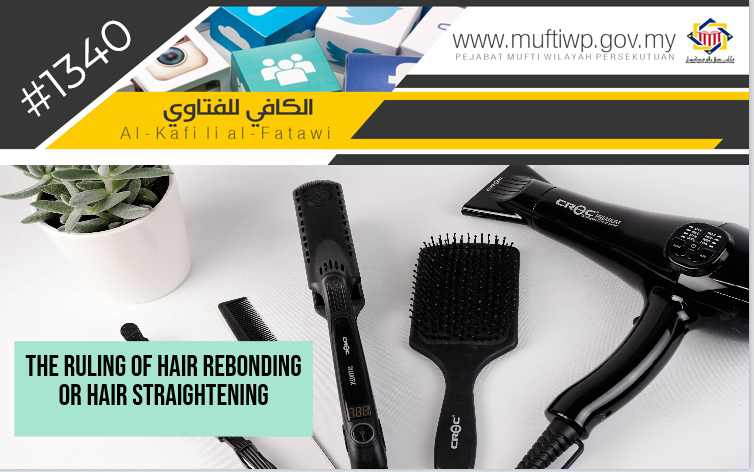
Question:
Assalamualaikum Dato. I want to ask, is it permissible for a husband to ask his wife to straighten her hair through rebonding so that it is straight and beautiful? Thank you.
Answer:
Waalaikumussalam wrt. wbt.
Alhamdulillah, praise and thanks to Allah for the countless blessings He has blessed us all with. Blessings and salutations to the Prophet Muhammad PBUH, his wives, his family, companions and all those that follow his teachings to the day of judgement.
Adornment and Beauty
Originally, Islam does not prohibit its followers to adorn themselves for beauty. Furthermore, Islam encourages its ummah to always be neat and beautiful and dress moderately appropriate with the situation. This is in accordance with the hadith narrated by Abdullah bin Mas’ud RA, where the Prophet PBUH said:
إِنَّ اللَّهَ جَمِيلٌ يُحِبُّ الْجَمَالَ
“Allah is Beautiful, He loves beauty.”
Sahih Muslim (275)
Imam al-Munawi said: “’He loves beauty’ means people who adorns themselves from among you…” (See Faidh al-Qodir, 2/224)
Adornment is a natural desire for every woman. However, Islam has set several guidelines as reference in adorning oneself. Allah SWT state:
وَقُل لِّلْمُؤْمِنَاتِ يَغْضُضْنَ مِنْ أَبْصَارِهِنَّ وَيَحْفَظْنَ فُرُوجَهُنَّ وَلَا يُبْدِينَ زِينَتَهُنَّ إِلَّا مَا ظَهَرَ مِنْهَا ۖوَلْيَضْرِبْنَ بِخُمُرِهِنَّ عَلَىٰ جُيُوبِهِنَّ ۖ وَلَا يُبْدِينَ زِينَتَهُنَّ إِلَّا لِبُعُولَتِهِنَّ أَوْ آبَائِهِنَّ أَوْ آبَاءِ بُعُولَتِهِنَّ أَوْ أَبْنَائِهِنَّ أَوْ أَبْنَاءِ بُعُولَتِهِنَّ أَوْ إِخْوَانِهِنَّ أَوْ بَنِي إِخْوَانِهِنَّ أَوْ بَنِي أَخَوَاتِهِنَّ أَوْ نِسَائِهِنَّ أَوْ مَا مَلَكَتْ أَيْمَانُهُنَّ أَوِ التَّابِعِينَ غَيْرِ أُولِي الْإِرْبَةِ مِنَ الرِّجَالِ أَوِ الطِّفْلِ الَّذِينَ لَمْ يَظْهَرُوا عَلَىٰ عَوْرَاتِ النِّسَاءِ ۖ وَلَا يَضْرِبْنَ بِأَرْجُلِهِنَّ لِيُعْلَمَ مَا يُخْفِينَ مِن زِينَتِهِنَّ ۚ وَتُوبُوا إِلَى اللَّـهِ جَمِيعًا أَيُّهَ الْمُؤْمِنُونَ لَعَلَّكُمْ تُفْلِحُونَ
“And tell the believing women to reduce [some] of their vision and guard their private parts and not expose their adornment except that which [necessarily] appears thereof and to wrap [a portion of] their headcovers over their chests and not expose their adornment except to their husbands, their fathers, their husbands' fathers, their sons, their husbands' sons, their brothers, their brothers' sons, their sisters' sons, their women, that which their right hands possess, or those male attendants having no physical desire, or children who are not yet aware of the private aspects of women. And let them not stamp their feet to make known what they conceal of their adornment. And turn to Allah in repentance, all of you, O believers, that you might succeed.”
Surah al-Nur (31)
Syeikh al-Maraghi in commenting the above verse state: “It is prohibited to showcase one’s adornment in front of other ajnabi (non-mahram). Unless what is difficult to be concealed, such as a ring.” (See Tafsir al-Maraghi 18/99)
It is clear that the original ruling related to clothing and any ornament is permissible except if there is any specific evidence against it. (See al-Fiqh al-Manhaji 3/90)
Changing of Hair
Scholars have differing opinions regarding this matter. Syeikh Muhammad al-Zuhaili stated that among them is the prohibition of coloring one’s hair and beard black. The reason is there are elements of deception and fabrication, for the color black will make it seems like one is younger than he actually is.
The same is stated for the prohibition of attaching or extending hair. It is prohibited for anyone to extend or attach one’s hair using human hair and animal fur which is considered as najis. As for animal fur which is not considered as najis, it is permissible with the permission of her husband. (See al-Fiqh al-Manhaji, 3/100)
This is in accordance with a hadith from Asma’ binti Abu Bakar R.Anha, he said, a woman came to meet the Prophet PBUH and asked a question:
يَا رَسُولَ اللَّهِ، إِنَّ لِي ابْنَةً عُرَيِّسًا، أَصَابَتْهَا حَصْبَةٌ فَتَمَرَّقَ شَعْرُهَا، أَفَأَصِلُهُ؟ فَقَالَ: لَعَنَ اللَّهُ الْوَاصِلَةَ وَالْمُسْتَوْصِلَةَ
“I have a daughter who has been newly wedded. She had an attack of smallpox and thus her hair had fallen; should I add false hair to her head? Thereupon Allah's Messenger (ﷺ) said: Allah has cursed the woman who adds some false hair and the woman who asks for it.”
Sahih al-Bukhari (5591) and Sahih Muslim (2122)
Regarding curling of one’s hair, the jurists have differing opinions about it. Imam Nawawi cited the opinion of Imam al-Haramain who said it is permissible to curl one’s hair the same as the ruling of coloring one’s hair with henna for married woman. (See al-Majmuk syarah al-Muhazzab, 3/140)
Imam Ramli in his book said: “It is prohibited to curl one’s hair, create a gap in one’s teeth, coloring one’s hair black, blushing one’s cheek, wearing henna and others. If it is with the permission of her husband then it is permissible. The reason is it is for the purpose of permissible adornment.” (See Nihayah al-Muhtaj ila Syarah al-Minhaj, 2/25)
Conclusion
Answering the above question, it can be concluded as the following:
- It is permissible to straighten one’s hair if the purpose is for beautification and adornment for her husband or one’s comfort. Furthermore, it is encouraged to maintain one’s hair and honouring A hadith from Abu Hurairah RA, the Prophet PBUH said:
مَنْ كَانَ لَهُ شَعْرٌ فَلْيُكْرِمْهُ
“He who has hair should honour it.”
Sunan Abu Daud (4163)
- Do not imitate the disbelievers and fasiq. It is not for the purpose of boasting or showcasing it to others. This would prevent the arrogance and ostentatiousness which will lead to Allah’s wrath. Moreover, covering one’s aurah is an obligation of every Muslim.
- Ensuring that the apparatus and chemicals used is not harmful on one’s hair.
Thus, the intention and purpose of it is the main factor in determining the ruling of straightening one’s hair. If the purpose is good and in accordance with syarak, then it is permissible. However, if its intention is bad such as deception and sinning as well as harmful, then it is prohibited.
Hopefully, this explanation will benefit us all in fulfilling our prayer obligations as has been sanctioned. Amin.

